Law Assignment 2: Case Study Analysis - Trust and Agency
VerifiedAdded on 2022/10/19
|8
|1851
|252
Case Study
AI Summary
This case study analysis examines two key issues within Australian Commercial and Corporations Law. Part A delves into the certainty required for creating a valid trust, analyzing the principles of express and implied trusts, and the 'three certainties' of intention, subject matter, and objects, as established in Knight v Knight. The analysis applies these principles to a scenario involving a shareholder declaring himself trustee of a portion of his shares. Part B investigates agency law, specifically the liability of a company for fees owed to an architect firm. It explores different types of agency, including express, implied, and ostensible authority, as outlined in cases such as Hely-Hutchinson v Brayhead Ltd and Crabtree-Vickers Pty Ltd v Australian Direct Mail Advertising & Addressing Co Pty Ltd. The application section considers whether the company is liable for the architect's fees based on the actions of its managing director, who may be considered an ostensible agent. The assignment concludes with a determination of the validity of the trust and the company's liability for the fees.
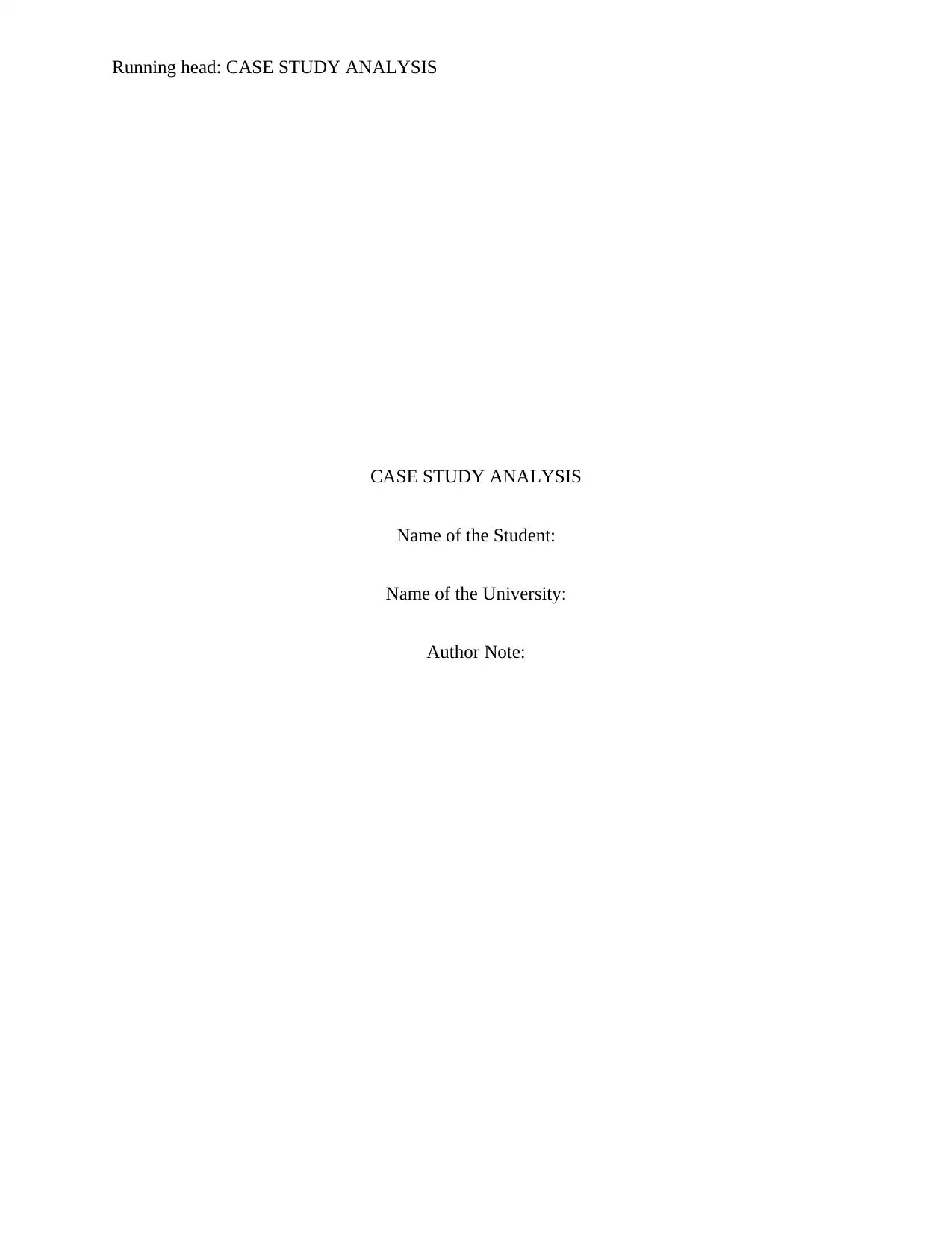
Running head: CASE STUDY ANALYSIS
CASE STUDY ANALYSIS
Name of the Student:
Name of the University:
Author Note:
CASE STUDY ANALYSIS
Name of the Student:
Name of the University:
Author Note:
Paraphrase This Document
Need a fresh take? Get an instant paraphrase of this document with our AI Paraphraser
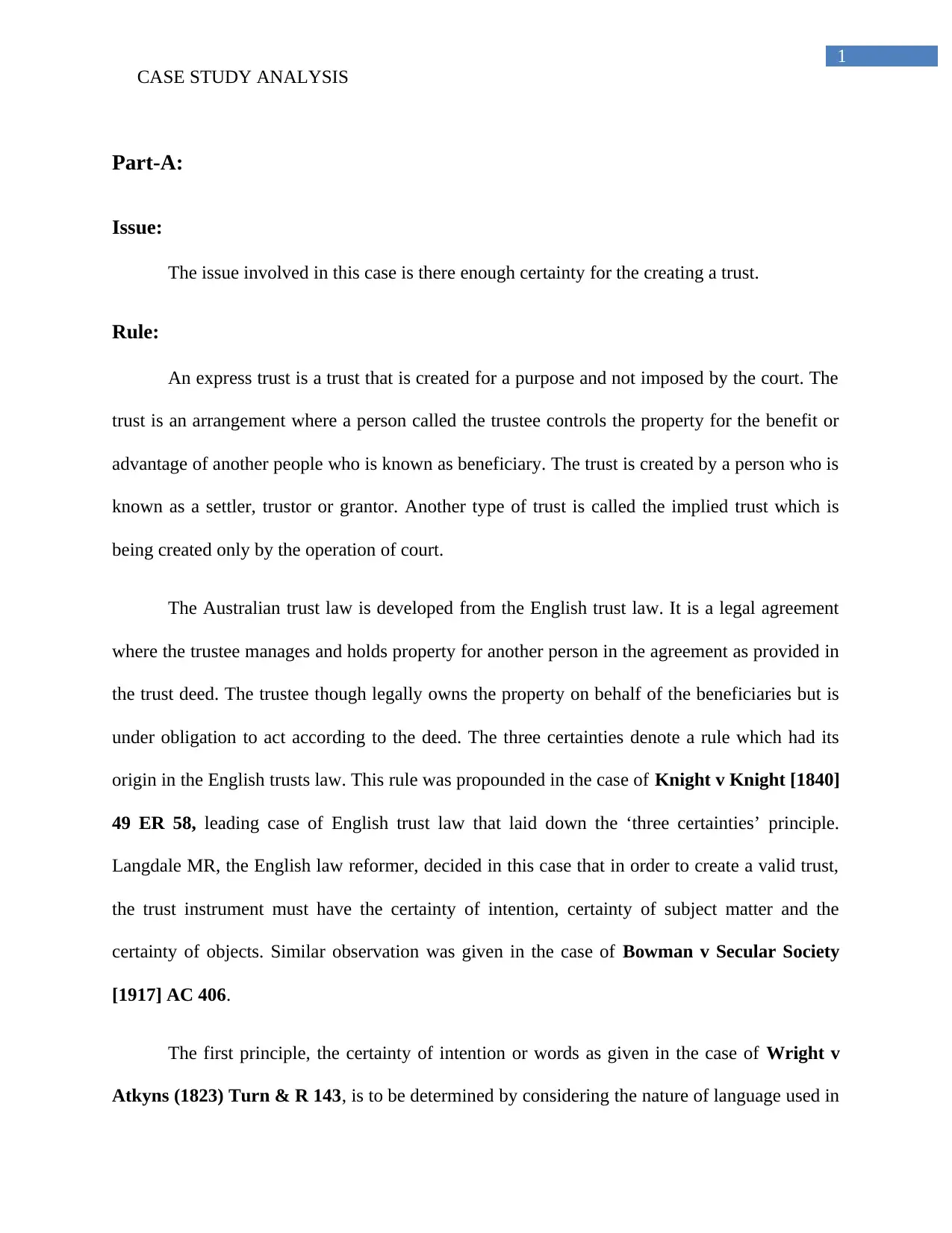
1
CASE STUDY ANALYSIS
Part-A:
Issue:
The issue involved in this case is there enough certainty for the creating a trust.
Rule:
An express trust is a trust that is created for a purpose and not imposed by the court. The
trust is an arrangement where a person called the trustee controls the property for the benefit or
advantage of another people who is known as beneficiary. The trust is created by a person who is
known as a settler, trustor or grantor. Another type of trust is called the implied trust which is
being created only by the operation of court.
The Australian trust law is developed from the English trust law. It is a legal agreement
where the trustee manages and holds property for another person in the agreement as provided in
the trust deed. The trustee though legally owns the property on behalf of the beneficiaries but is
under obligation to act according to the deed. The three certainties denote a rule which had its
origin in the English trusts law. This rule was propounded in the case of Knight v Knight [1840]
49 ER 58, leading case of English trust law that laid down the ‘three certainties’ principle.
Langdale MR, the English law reformer, decided in this case that in order to create a valid trust,
the trust instrument must have the certainty of intention, certainty of subject matter and the
certainty of objects. Similar observation was given in the case of Bowman v Secular Society
[1917] AC 406.
The first principle, the certainty of intention or words as given in the case of Wright v
Atkyns (1823) Turn & R 143, is to be determined by considering the nature of language used in
CASE STUDY ANALYSIS
Part-A:
Issue:
The issue involved in this case is there enough certainty for the creating a trust.
Rule:
An express trust is a trust that is created for a purpose and not imposed by the court. The
trust is an arrangement where a person called the trustee controls the property for the benefit or
advantage of another people who is known as beneficiary. The trust is created by a person who is
known as a settler, trustor or grantor. Another type of trust is called the implied trust which is
being created only by the operation of court.
The Australian trust law is developed from the English trust law. It is a legal agreement
where the trustee manages and holds property for another person in the agreement as provided in
the trust deed. The trustee though legally owns the property on behalf of the beneficiaries but is
under obligation to act according to the deed. The three certainties denote a rule which had its
origin in the English trusts law. This rule was propounded in the case of Knight v Knight [1840]
49 ER 58, leading case of English trust law that laid down the ‘three certainties’ principle.
Langdale MR, the English law reformer, decided in this case that in order to create a valid trust,
the trust instrument must have the certainty of intention, certainty of subject matter and the
certainty of objects. Similar observation was given in the case of Bowman v Secular Society
[1917] AC 406.
The first principle, the certainty of intention or words as given in the case of Wright v
Atkyns (1823) Turn & R 143, is to be determined by considering the nature of language used in
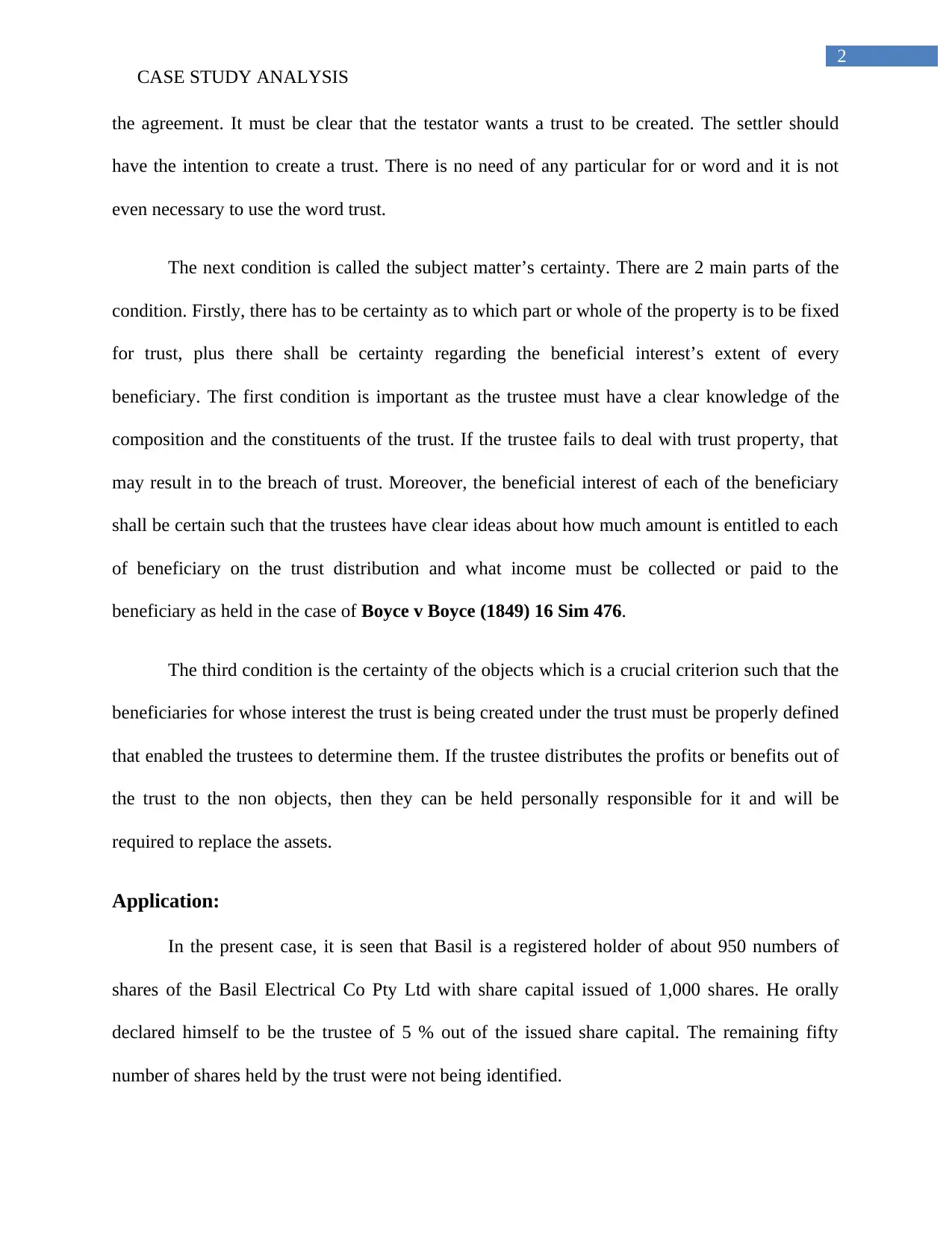
2
CASE STUDY ANALYSIS
the agreement. It must be clear that the testator wants a trust to be created. The settler should
have the intention to create a trust. There is no need of any particular for or word and it is not
even necessary to use the word trust.
The next condition is called the subject matter’s certainty. There are 2 main parts of the
condition. Firstly, there has to be certainty as to which part or whole of the property is to be fixed
for trust, plus there shall be certainty regarding the beneficial interest’s extent of every
beneficiary. The first condition is important as the trustee must have a clear knowledge of the
composition and the constituents of the trust. If the trustee fails to deal with trust property, that
may result in to the breach of trust. Moreover, the beneficial interest of each of the beneficiary
shall be certain such that the trustees have clear ideas about how much amount is entitled to each
of beneficiary on the trust distribution and what income must be collected or paid to the
beneficiary as held in the case of Boyce v Boyce (1849) 16 Sim 476.
The third condition is the certainty of the objects which is a crucial criterion such that the
beneficiaries for whose interest the trust is being created under the trust must be properly defined
that enabled the trustees to determine them. If the trustee distributes the profits or benefits out of
the trust to the non objects, then they can be held personally responsible for it and will be
required to replace the assets.
Application:
In the present case, it is seen that Basil is a registered holder of about 950 numbers of
shares of the Basil Electrical Co Pty Ltd with share capital issued of 1,000 shares. He orally
declared himself to be the trustee of 5 % out of the issued share capital. The remaining fifty
number of shares held by the trust were not being identified.
CASE STUDY ANALYSIS
the agreement. It must be clear that the testator wants a trust to be created. The settler should
have the intention to create a trust. There is no need of any particular for or word and it is not
even necessary to use the word trust.
The next condition is called the subject matter’s certainty. There are 2 main parts of the
condition. Firstly, there has to be certainty as to which part or whole of the property is to be fixed
for trust, plus there shall be certainty regarding the beneficial interest’s extent of every
beneficiary. The first condition is important as the trustee must have a clear knowledge of the
composition and the constituents of the trust. If the trustee fails to deal with trust property, that
may result in to the breach of trust. Moreover, the beneficial interest of each of the beneficiary
shall be certain such that the trustees have clear ideas about how much amount is entitled to each
of beneficiary on the trust distribution and what income must be collected or paid to the
beneficiary as held in the case of Boyce v Boyce (1849) 16 Sim 476.
The third condition is the certainty of the objects which is a crucial criterion such that the
beneficiaries for whose interest the trust is being created under the trust must be properly defined
that enabled the trustees to determine them. If the trustee distributes the profits or benefits out of
the trust to the non objects, then they can be held personally responsible for it and will be
required to replace the assets.
Application:
In the present case, it is seen that Basil is a registered holder of about 950 numbers of
shares of the Basil Electrical Co Pty Ltd with share capital issued of 1,000 shares. He orally
declared himself to be the trustee of 5 % out of the issued share capital. The remaining fifty
number of shares held by the trust were not being identified.
⊘ This is a preview!⊘
Do you want full access?
Subscribe today to unlock all pages.

Trusted by 1+ million students worldwide
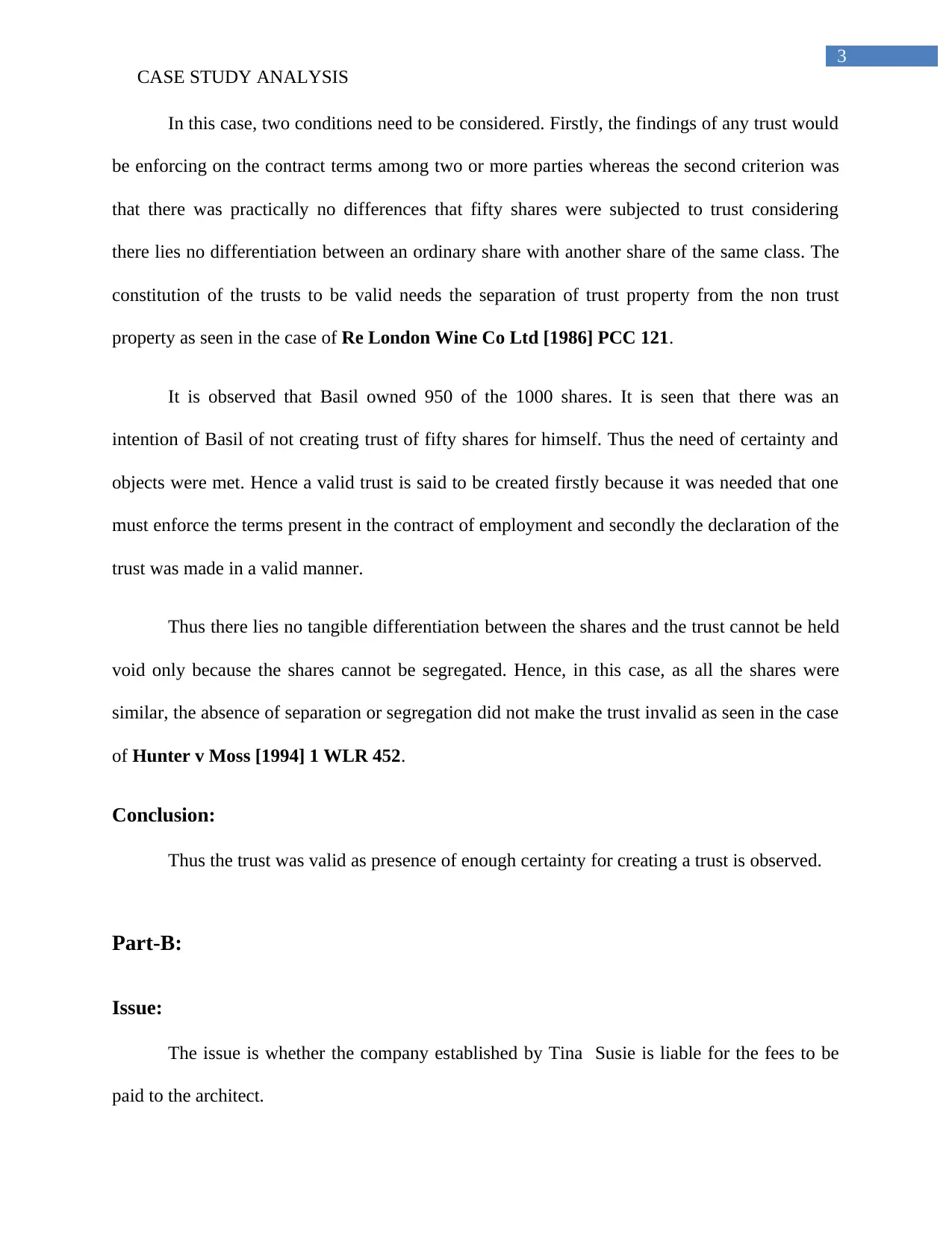
3
CASE STUDY ANALYSIS
In this case, two conditions need to be considered. Firstly, the findings of any trust would
be enforcing on the contract terms among two or more parties whereas the second criterion was
that there was practically no differences that fifty shares were subjected to trust considering
there lies no differentiation between an ordinary share with another share of the same class. The
constitution of the trusts to be valid needs the separation of trust property from the non trust
property as seen in the case of Re London Wine Co Ltd [1986] PCC 121.
It is observed that Basil owned 950 of the 1000 shares. It is seen that there was an
intention of Basil of not creating trust of fifty shares for himself. Thus the need of certainty and
objects were met. Hence a valid trust is said to be created firstly because it was needed that one
must enforce the terms present in the contract of employment and secondly the declaration of the
trust was made in a valid manner.
Thus there lies no tangible differentiation between the shares and the trust cannot be held
void only because the shares cannot be segregated. Hence, in this case, as all the shares were
similar, the absence of separation or segregation did not make the trust invalid as seen in the case
of Hunter v Moss [1994] 1 WLR 452.
Conclusion:
Thus the trust was valid as presence of enough certainty for creating a trust is observed.
Part-B:
Issue:
The issue is whether the company established by Tina Susie is liable for the fees to be
paid to the architect.
CASE STUDY ANALYSIS
In this case, two conditions need to be considered. Firstly, the findings of any trust would
be enforcing on the contract terms among two or more parties whereas the second criterion was
that there was practically no differences that fifty shares were subjected to trust considering
there lies no differentiation between an ordinary share with another share of the same class. The
constitution of the trusts to be valid needs the separation of trust property from the non trust
property as seen in the case of Re London Wine Co Ltd [1986] PCC 121.
It is observed that Basil owned 950 of the 1000 shares. It is seen that there was an
intention of Basil of not creating trust of fifty shares for himself. Thus the need of certainty and
objects were met. Hence a valid trust is said to be created firstly because it was needed that one
must enforce the terms present in the contract of employment and secondly the declaration of the
trust was made in a valid manner.
Thus there lies no tangible differentiation between the shares and the trust cannot be held
void only because the shares cannot be segregated. Hence, in this case, as all the shares were
similar, the absence of separation or segregation did not make the trust invalid as seen in the case
of Hunter v Moss [1994] 1 WLR 452.
Conclusion:
Thus the trust was valid as presence of enough certainty for creating a trust is observed.
Part-B:
Issue:
The issue is whether the company established by Tina Susie is liable for the fees to be
paid to the architect.
Paraphrase This Document
Need a fresh take? Get an instant paraphrase of this document with our AI Paraphraser
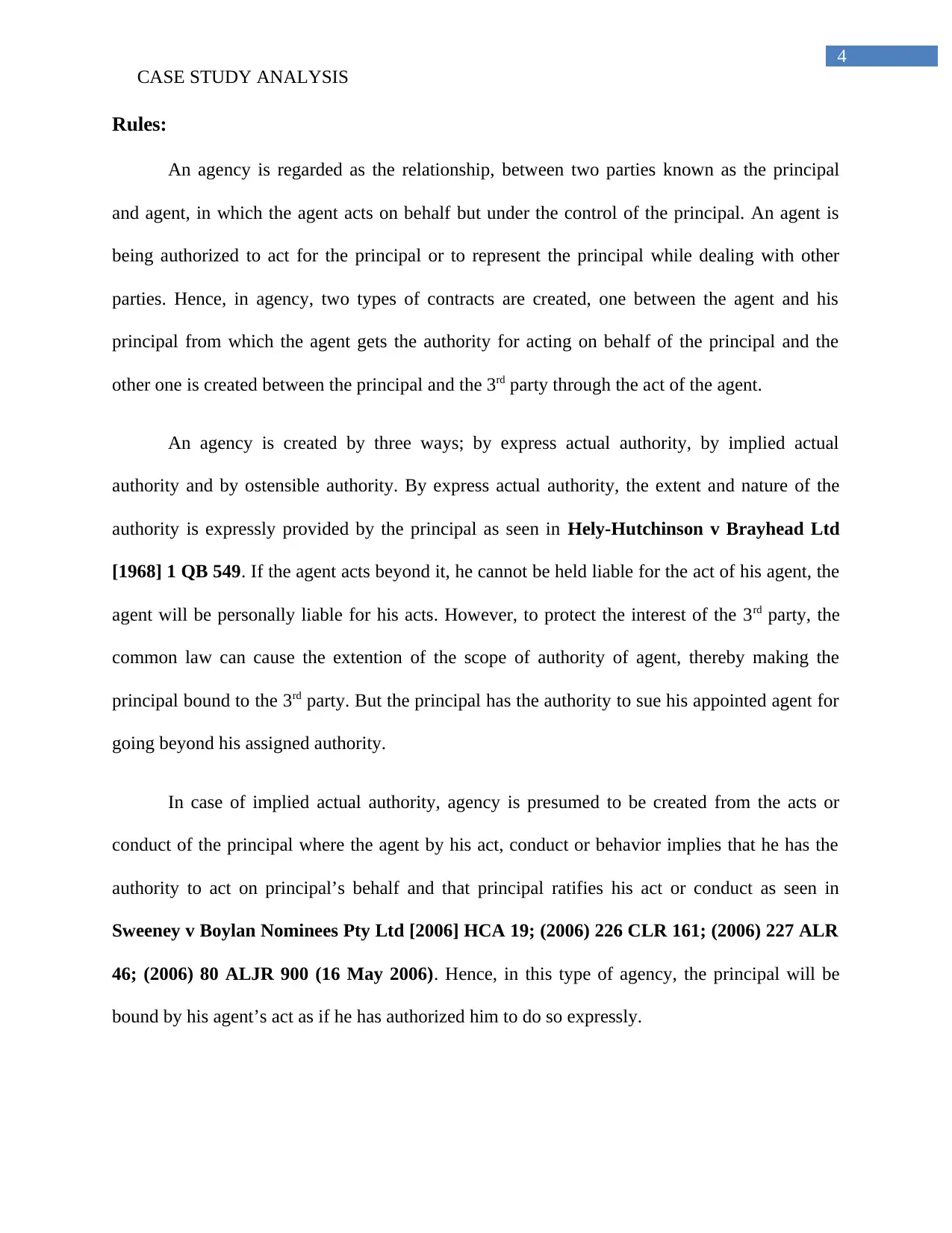
4
CASE STUDY ANALYSIS
Rules:
An agency is regarded as the relationship, between two parties known as the principal
and agent, in which the agent acts on behalf but under the control of the principal. An agent is
being authorized to act for the principal or to represent the principal while dealing with other
parties. Hence, in agency, two types of contracts are created, one between the agent and his
principal from which the agent gets the authority for acting on behalf of the principal and the
other one is created between the principal and the 3rd party through the act of the agent.
An agency is created by three ways; by express actual authority, by implied actual
authority and by ostensible authority. By express actual authority, the extent and nature of the
authority is expressly provided by the principal as seen in Hely-Hutchinson v Brayhead Ltd
[1968] 1 QB 549. If the agent acts beyond it, he cannot be held liable for the act of his agent, the
agent will be personally liable for his acts. However, to protect the interest of the 3rd party, the
common law can cause the extention of the scope of authority of agent, thereby making the
principal bound to the 3rd party. But the principal has the authority to sue his appointed agent for
going beyond his assigned authority.
In case of implied actual authority, agency is presumed to be created from the acts or
conduct of the principal where the agent by his act, conduct or behavior implies that he has the
authority to act on principal’s behalf and that principal ratifies his act or conduct as seen in
Sweeney v Boylan Nominees Pty Ltd [2006] HCA 19; (2006) 226 CLR 161; (2006) 227 ALR
46; (2006) 80 ALJR 900 (16 May 2006). Hence, in this type of agency, the principal will be
bound by his agent’s act as if he has authorized him to do so expressly.
CASE STUDY ANALYSIS
Rules:
An agency is regarded as the relationship, between two parties known as the principal
and agent, in which the agent acts on behalf but under the control of the principal. An agent is
being authorized to act for the principal or to represent the principal while dealing with other
parties. Hence, in agency, two types of contracts are created, one between the agent and his
principal from which the agent gets the authority for acting on behalf of the principal and the
other one is created between the principal and the 3rd party through the act of the agent.
An agency is created by three ways; by express actual authority, by implied actual
authority and by ostensible authority. By express actual authority, the extent and nature of the
authority is expressly provided by the principal as seen in Hely-Hutchinson v Brayhead Ltd
[1968] 1 QB 549. If the agent acts beyond it, he cannot be held liable for the act of his agent, the
agent will be personally liable for his acts. However, to protect the interest of the 3rd party, the
common law can cause the extention of the scope of authority of agent, thereby making the
principal bound to the 3rd party. But the principal has the authority to sue his appointed agent for
going beyond his assigned authority.
In case of implied actual authority, agency is presumed to be created from the acts or
conduct of the principal where the agent by his act, conduct or behavior implies that he has the
authority to act on principal’s behalf and that principal ratifies his act or conduct as seen in
Sweeney v Boylan Nominees Pty Ltd [2006] HCA 19; (2006) 226 CLR 161; (2006) 227 ALR
46; (2006) 80 ALJR 900 (16 May 2006). Hence, in this type of agency, the principal will be
bound by his agent’s act as if he has authorized him to do so expressly.
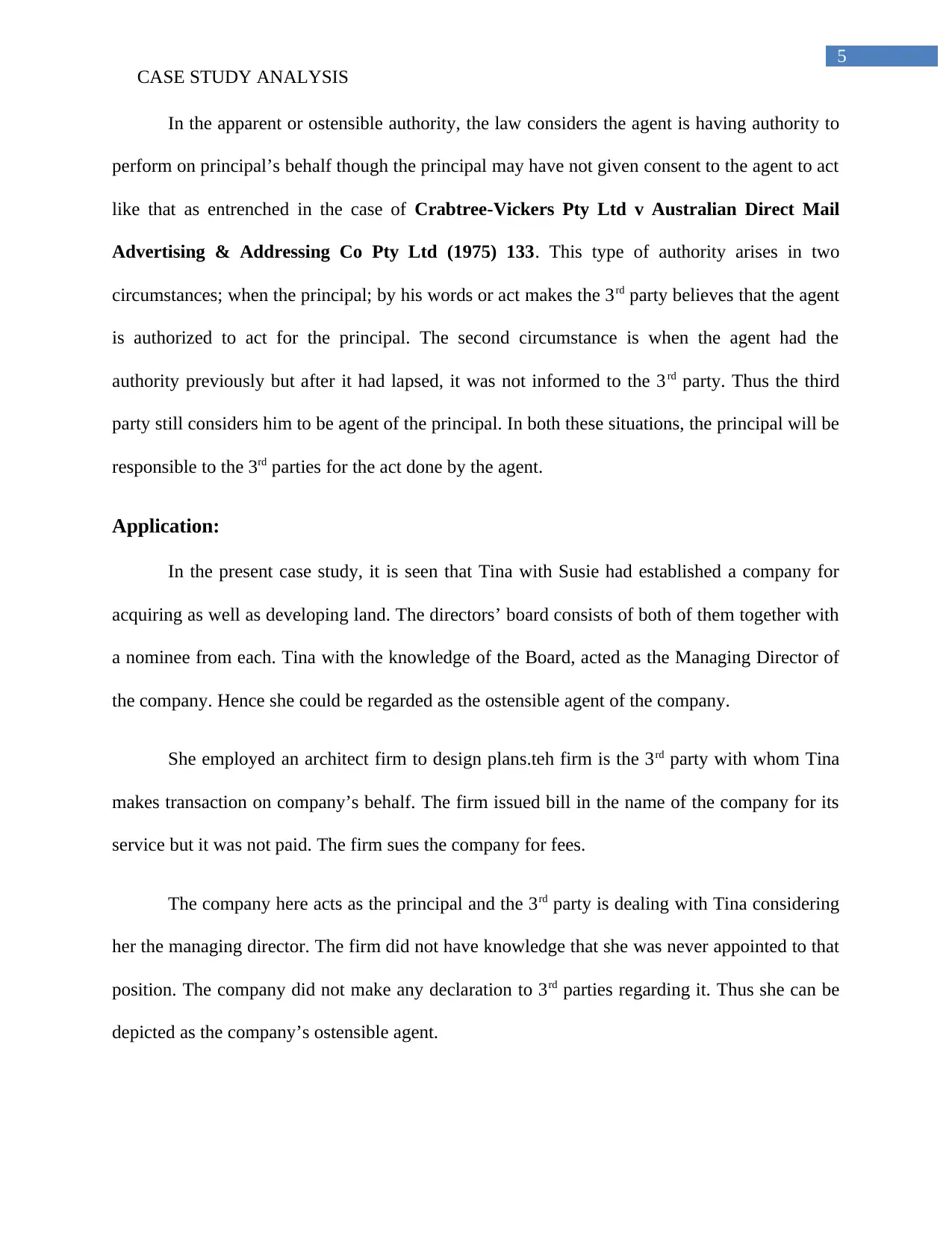
5
CASE STUDY ANALYSIS
In the apparent or ostensible authority, the law considers the agent is having authority to
perform on principal’s behalf though the principal may have not given consent to the agent to act
like that as entrenched in the case of Crabtree-Vickers Pty Ltd v Australian Direct Mail
Advertising & Addressing Co Pty Ltd (1975) 133. This type of authority arises in two
circumstances; when the principal; by his words or act makes the 3rd party believes that the agent
is authorized to act for the principal. The second circumstance is when the agent had the
authority previously but after it had lapsed, it was not informed to the 3rd party. Thus the third
party still considers him to be agent of the principal. In both these situations, the principal will be
responsible to the 3rd parties for the act done by the agent.
Application:
In the present case study, it is seen that Tina with Susie had established a company for
acquiring as well as developing land. The directors’ board consists of both of them together with
a nominee from each. Tina with the knowledge of the Board, acted as the Managing Director of
the company. Hence she could be regarded as the ostensible agent of the company.
She employed an architect firm to design plans.teh firm is the 3rd party with whom Tina
makes transaction on company’s behalf. The firm issued bill in the name of the company for its
service but it was not paid. The firm sues the company for fees.
The company here acts as the principal and the 3rd party is dealing with Tina considering
her the managing director. The firm did not have knowledge that she was never appointed to that
position. The company did not make any declaration to 3rd parties regarding it. Thus she can be
depicted as the company’s ostensible agent.
CASE STUDY ANALYSIS
In the apparent or ostensible authority, the law considers the agent is having authority to
perform on principal’s behalf though the principal may have not given consent to the agent to act
like that as entrenched in the case of Crabtree-Vickers Pty Ltd v Australian Direct Mail
Advertising & Addressing Co Pty Ltd (1975) 133. This type of authority arises in two
circumstances; when the principal; by his words or act makes the 3rd party believes that the agent
is authorized to act for the principal. The second circumstance is when the agent had the
authority previously but after it had lapsed, it was not informed to the 3rd party. Thus the third
party still considers him to be agent of the principal. In both these situations, the principal will be
responsible to the 3rd parties for the act done by the agent.
Application:
In the present case study, it is seen that Tina with Susie had established a company for
acquiring as well as developing land. The directors’ board consists of both of them together with
a nominee from each. Tina with the knowledge of the Board, acted as the Managing Director of
the company. Hence she could be regarded as the ostensible agent of the company.
She employed an architect firm to design plans.teh firm is the 3rd party with whom Tina
makes transaction on company’s behalf. The firm issued bill in the name of the company for its
service but it was not paid. The firm sues the company for fees.
The company here acts as the principal and the 3rd party is dealing with Tina considering
her the managing director. The firm did not have knowledge that she was never appointed to that
position. The company did not make any declaration to 3rd parties regarding it. Thus she can be
depicted as the company’s ostensible agent.
⊘ This is a preview!⊘
Do you want full access?
Subscribe today to unlock all pages.

Trusted by 1+ million students worldwide

6
CASE STUDY ANALYSIS
Conclusion:
Thus it can be concluded that the company is liable to pay the fees to the firm.
CASE STUDY ANALYSIS
Conclusion:
Thus it can be concluded that the company is liable to pay the fees to the firm.
Paraphrase This Document
Need a fresh take? Get an instant paraphrase of this document with our AI Paraphraser
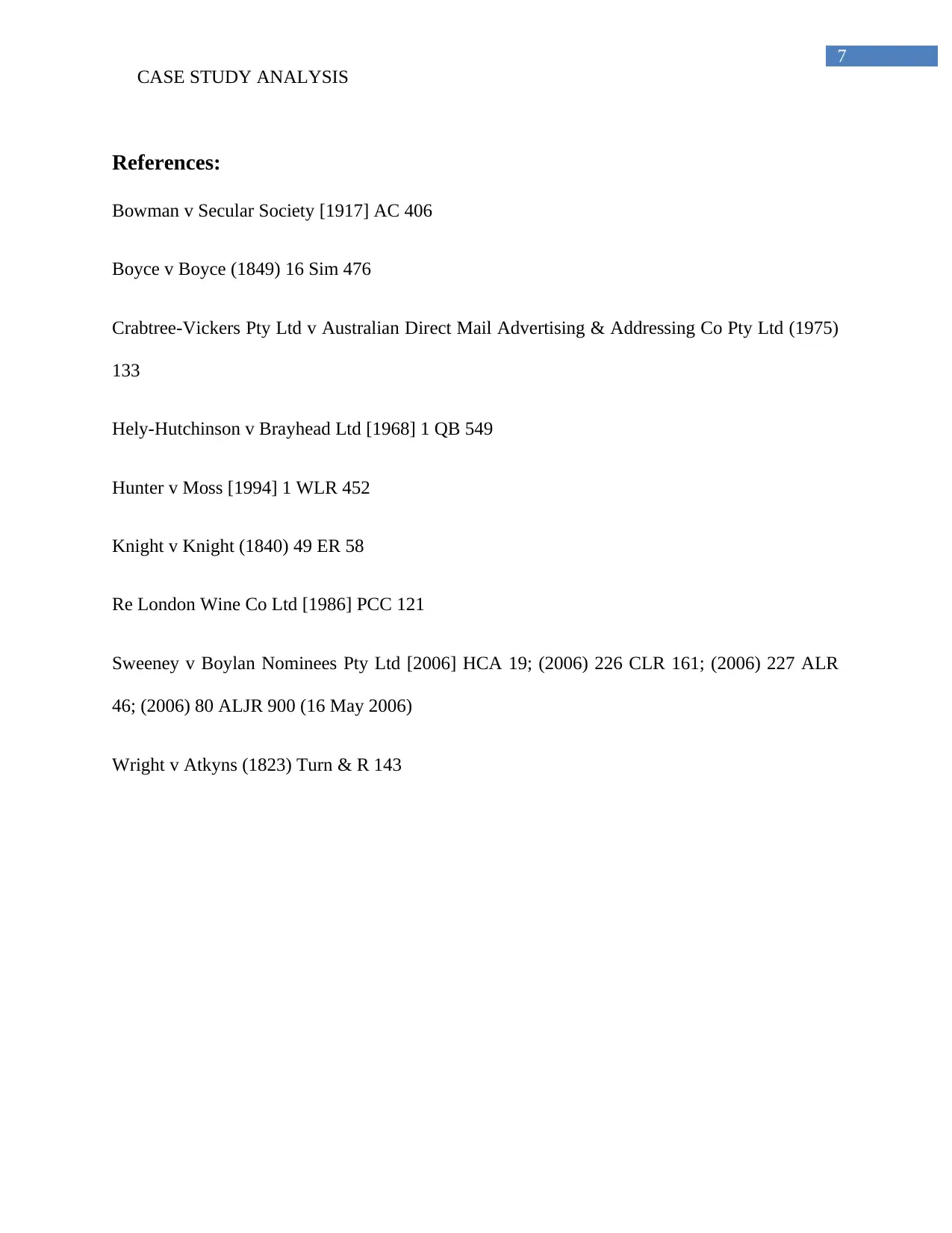
7
CASE STUDY ANALYSIS
References:
Bowman v Secular Society [1917] AC 406
Boyce v Boyce (1849) 16 Sim 476
Crabtree-Vickers Pty Ltd v Australian Direct Mail Advertising & Addressing Co Pty Ltd (1975)
133
Hely-Hutchinson v Brayhead Ltd [1968] 1 QB 549
Hunter v Moss [1994] 1 WLR 452
Knight v Knight (1840) 49 ER 58
Re London Wine Co Ltd [1986] PCC 121
Sweeney v Boylan Nominees Pty Ltd [2006] HCA 19; (2006) 226 CLR 161; (2006) 227 ALR
46; (2006) 80 ALJR 900 (16 May 2006)
Wright v Atkyns (1823) Turn & R 143
CASE STUDY ANALYSIS
References:
Bowman v Secular Society [1917] AC 406
Boyce v Boyce (1849) 16 Sim 476
Crabtree-Vickers Pty Ltd v Australian Direct Mail Advertising & Addressing Co Pty Ltd (1975)
133
Hely-Hutchinson v Brayhead Ltd [1968] 1 QB 549
Hunter v Moss [1994] 1 WLR 452
Knight v Knight (1840) 49 ER 58
Re London Wine Co Ltd [1986] PCC 121
Sweeney v Boylan Nominees Pty Ltd [2006] HCA 19; (2006) 226 CLR 161; (2006) 227 ALR
46; (2006) 80 ALJR 900 (16 May 2006)
Wright v Atkyns (1823) Turn & R 143
1 out of 8
Related Documents
Your All-in-One AI-Powered Toolkit for Academic Success.
+13062052269
info@desklib.com
Available 24*7 on WhatsApp / Email
![[object Object]](/_next/static/media/star-bottom.7253800d.svg)
Unlock your academic potential
Copyright © 2020–2026 A2Z Services. All Rights Reserved. Developed and managed by ZUCOL.




